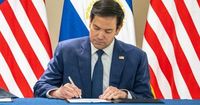The city of Dallas was rocked by a gruesome murder on September 10, 2025, when 41-year-old Chandramouli Nagamallaiah was brutally attacked and decapitated at a local motel. The accused, 37-year-old Yordanis Cobos-Martinez, an undocumented immigrant from Cuba with a lengthy criminal history, was swiftly arrested by Dallas Police and charged with capital murder. According to The Economic Times, authorities allege that Martinez used a machete to behead Nagamallaiah after a heated argument—an act witnessed by the victim’s spouse and child. In a shocking detail, officials say Martinez then kicked the severed head “around like a soccer ball” before leaving it in a trash bin.
As the Dallas community reels from the horror, the case has become emblematic of broader debates over U.S. immigration, law enforcement, and policy toward Cuba. The Department of Homeland Security (DHS) confirmed that Martinez, who had previous convictions for child sex abuse, grand theft auto, false imprisonment, and carjacking, had been in ICE custody at the Bluebonnet Detention Centre. He was released on an Order of Supervision on January 13, 2025, under the Biden administration. Now, the Trump administration has announced plans to deport Martinez to Cuba, adding another layer of political complexity to an already volatile situation.
California Representative Ro Khanna, a Democrat, condemned the crime, reflecting the bipartisan outrage that has followed the attack. The brutality of the act, coupled with Martinez’s criminal record and immigration status, has reignited fierce arguments over border security, the handling of undocumented immigrants with criminal backgrounds, and the responsibilities of federal agencies.
Meanwhile, the murder comes at a time of heightened tension in U.S.-Cuba relations—tensions that are both reflected in, and exacerbated by, public opinion on the island. On September 12, 2025, a survey conducted by CiberCuba and reported by several outlets revealed that 58% of 1,752 Cuban respondents believe the United States should adopt even stricter policies toward the regime in Havana. Only 20% opposed tougher measures, while 22% felt that current U.S. policy is already quite harsh. The survey, shared on CiberCuba’s social media platforms, highlights a growing dissatisfaction among Cubans with their own government and a perception that existing U.S. sanctions and restrictions are not enough to provoke meaningful change.
According to CiberCuba, many Cubans see international pressure—especially from Washington—as a vital tool to weaken the Communist Party’s grip on power. This view stands in sharp contrast to the Cuban government’s official narrative, which blames the U.S. embargo for the island’s economic and social woes. In reality, the survey suggests that popular discontent is aimed primarily at the regime, not at American policy, and that a significant portion of Cubans believe tighter U.S. measures could accelerate internal reforms, reduce the power of the security apparatus, and open the door to greater freedoms.
The Trump administration, now in its second term, has responded to these dynamics with a series of aggressive policy moves. Immediately after taking office again, President Trump reinstated Cuba on the U.S. list of state sponsors of terrorism—an action that triggers additional financial sanctions and international restrictions. On January 31, 2025, Secretary of State Marco Rubio announced that several Cuban entities, including the powerful military conglomerate GAESA, would be re-added to restrictive lists limiting their access to the global financial system.
In February 2025, Trump signed an executive order that blocks Cuba and other “foreign adversary countries” from accessing strategic U.S. technologies, including artificial intelligence, semiconductors, and biotechnology. By June 5, 2025, the administration issued a presidential order partially limiting the entry of nationals from several countries, Cuba included, under certain national security provisions. Most recently, in September 2025, Trump extended the economic embargo on Cuba for another year—maintaining the web of commercial and financial restrictions that have defined U.S.-Cuba relations for decades.
The Cuban government, for its part, has condemned these sanctions as “criminal behavior” and violations of human rights. Officials in Havana argue that the measures are designed to suffocate the Cuban people and stifle economic development. Yet, as reported by CiberCuba, many ordinary Cubans see the real “blockade” as internal—a product of government policies that stifle free enterprise and restrict personal freedoms. The sanctions, they argue, are intended to weaken the regime’s military and security apparatus, not to punish the Cuban populace.
While the murder in Dallas has drawn the nation’s attention to the issue of Cuban migration, the legal landscape for Cuban nationals in the United States is also shifting. On September 12, 2025, a federal appeals court ruled that the Trump administration could end legal protections for approximately 430,000 migrants from Cuba, Haiti, Nicaragua, and Venezuela. These humanitarian parole protections, established during the Biden administration, allowed migrants to live in the U.S. for two years with work authorization. The court’s decision, as reported by the Associated Press, lifts a previous stay and enables the administration to begin rescinding these protections while ongoing litigation continues.
The Department of Homeland Security has argued that revoking parole on a case-by-case basis would be a “gargantuan task,” asserting that the Secretary has broad discretion to end such benefits. Plaintiffs, including many who benefited from the program, contend that the administration ignored humanitarian concerns and that each case should be evaluated individually. “People who came here from Cuba, Haiti, Nicaragua, and Venezuela did everything the government asked of them, and the Trump administration cruelly and nonsensically failed to hold up the government’s end of the bargain,” said Esther Sung, legal director of the Justice Action Center, as quoted by the AP. She added, “While we are deeply disappointed by this decision, we will continue to advocate zealously for our clients and class members as the litigation continues.”
The Trump administration’s stance is clear: these protections were always meant to be temporary, and the government is now moving to dismantle what attorneys for the migrants have called “the largest mass illegalization event in modern American history.” Trump himself has repeatedly promised to deport millions, and the administration’s actions reflect a broader effort to roll back Biden-era policies that expanded legal pathways for migrants.
With the Dallas murder still fresh in public memory and U.S.-Cuba relations at a boiling point, the debate over immigration, humanitarian protections, and sanctions is as fierce as ever. The confluence of individual tragedy, shifting public opinion, and sweeping policy changes has left both nations—and their citizens—facing an uncertain future.




